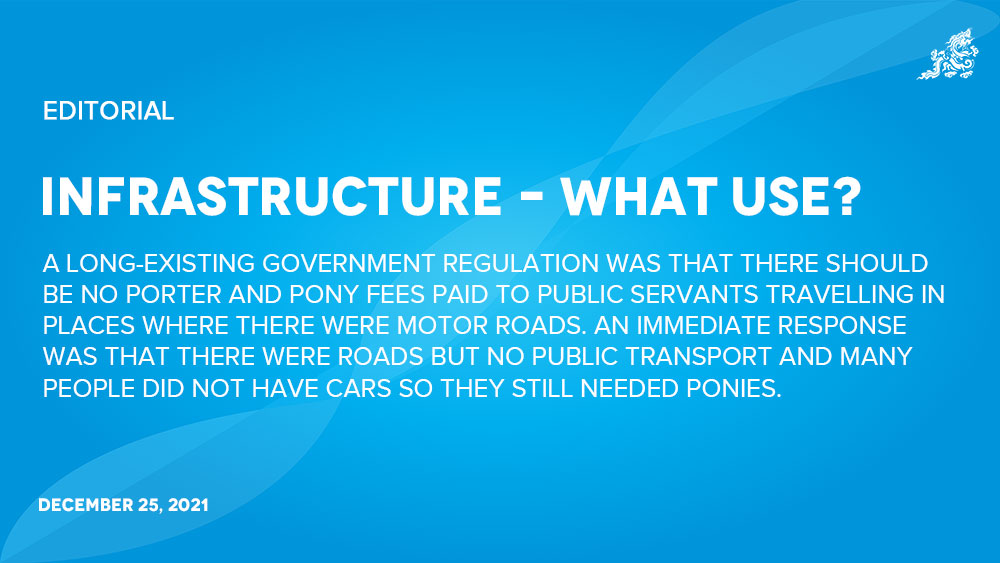A long-existing government regulation was that there should be no porter and pony fees paid to public servants travelling in places where there were motor roads. An immediate response was that there were roads but no public transport and many people did not have cars so they still needed ponies. A telling incident was a dzongdag informing the Ministry of Information and Communications that a remote gewog in his dzongkhag was asking for bus service. The response from the ministry was, “There’s a road there”? Roads are built by another ministry.
In recent years, governments have pledged and built highways and by-ways deep into the interior, sometimes permanently scarring the mountainsides. But many of these farm roads are not used and not maintained.
Health services in Bhutan are provided free by the government, to the amazement of some countries around the world. But our rugged terrain requires some people to travel long distances, so we have a section of the population that finds it difficult to reach the health services.
Education is free up to and beyond the tertiary levels if we take into account vocational training. Yet what our children learn and what society and the market need often do not match. Meanwhile, the education system itself has suffered from policy changes when governments change and reject the previous government’s policies.
The government records more than 90 percent coverage of water services in the country. Yet the De-Suung water projects revealed that numerous rural communities are desperately in need of water for drinking and irrigation. It turns out that, here too, the original infrastructure was not built to specifications and then not maintained.
Decades later, on National Day 2021, His Majesty The King reminded the nation that merely constructing infrastructure was not enough. People need access, know-how, and funds to use them. This was a stark reminder of national priorities; in this case, it was feedback submitted by one woman. This citizen did not ask to become rich; she asked for the opportunity to earn the basic essentials in life.
The thrust of Bhutan’s development process evolved from infrastructure to the information age and then to the age of technology, but our national planning mindset seems to have been suspended in the infrastructure stage. And we have not fully moved from motor highways to the information highway, which is digital communication.
Even with the emphasis on technology at a sophistication that will take us to the world stage, we are still waiting for basics like redundancy in connectivity. Today, there are trends where the potential uses have preceded infrastructure. For example, globalisation has given us access to the latest devices, but our connectivity does not live up to it. Thimphu has launched 5G but students in rural areas cannot access online classes.
His Majesty The King has emphasised the importance of prosperity, not in the sense of creating a few wealthy individuals but for the entire population to be able to access the services that characterise a GNH society in the true sense. Politicians living in Thimphu confide that their campaign trips into rural Bhutan show them inequities that they had not seen. The Thimphu elite are surprised by poverty levels in their own neighbourhoods. Lawmakers and policy makers live on different sides of a coin and the people on yet another side.
Today, we know of Royal concerns that are becoming more urgent for a number of reasons: society remains dependent on kidu, we have the wrong skills, there is a malaise nurturing the wrong attitudes, corruption is instilling wrong values, and the concern of the day is that accountability is in short supply.
His Majesty laments the decline of the nga (mettle, grit, resolve, stamina) in the Bhutanese people. Nga, in this context, is not physical strength, but the refining of the Bhutanese personality with innovative ideas, discipline, resolve, and grasp. For public servants, it is the need to break silos and coordinate activities of different government agencies to achieve the same goals.
Can it be done? The De-Suung Skilling Programme sees lawyers, artists, school and university graduates as well as drop-outs, film makers, businessmen, engineers, and youth laid off from various jobs because of the Covid pandemic get together and build life-giving projects in remote areas.
Imagine what our leaders should achieve, given the exposure, education, training, and inspiration that we receive?


